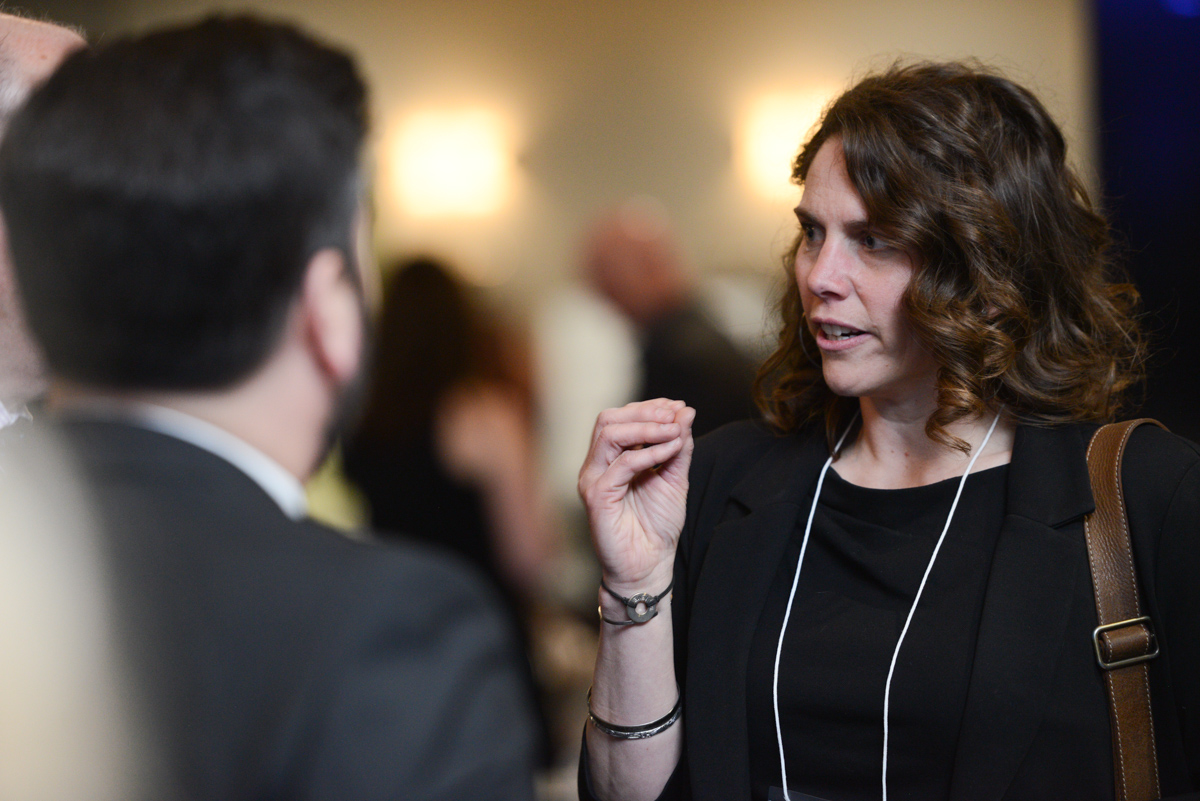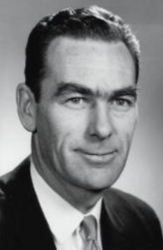About The Tansley Lecture Series

Named in honour of Donald D. Tansley and his remarkable career as a senior civil servant in Canada, The Tansley Lecture is one of the Johnson Shoyama Graduate School of Public Policy's flagship events. Held annually in Regina, Saskatchewan, this event is an opportune time for civil servants and community members—many of whom are JSGS alumni—to network and exchange ideas with students and academics during the cocktail hour and before the dinner reception and guest lecture.
Each year, a guest speaker is selected based on knowledge of, or experience with, using or adapting the machinery of government or the non-profit sector to implement innovative and often contentious policy decisions, achieve an ambitious policy objective, or better serve the public interest. At times, this requires a major restructuring of government and its agencies or a reorientation of the public sector relative to other sectors in society.
Past speakers have included Dr. Jay Famiglietti, Executive Director of the Global Institute of Water Security; the Honourable Preston Manning, Political Activist and Commentator; Colin Robertson, former Canadian Diplomat; David Herle, Principal, Gandalf Group; and Chantal Hébert, National Affairs Columnist, The Toronto Star.

Held in conjunction with The Tansley Lecture, the school also hosts its annual poster competition, providing students with an opportunity to showcase their work in front of a crowd of 300+ government, community, corporate and university stakeholders. Posters are presented to and evaluated by a panel of three judges during the afternoon session, and later again to those attending the cocktail hour. The winner of the poster competition is announced at the end of the evening and goes on to compete at the national IPAC poster competition.
About Donald D. Tansley (1925-2007)

Born in Regina on May 19, 1925, Donald Tansley served overseas with the Regina Rifle Regiment. He joined the Government of Saskatchewan in 1950 after graduating in arts and commerce from the University of Saskatchewan. During his time in government, Mr. Tansley played a pivotal role in several areas, including chairing the committee that implemented the country’s first working model of medicare. Mr. Tansley spent four years as a key deputy minister in the modernization of the New Brunswick government before moving to Ottawa where he served the federal government in various positions, including Deputy Minister of Fisheries and Oceans. Mr. Tansley was noted for his great organizational skills and his ability to work in challenging public policy environments.
2022 Tansley Lecture
Economic Growth for Canadians will depend on our ability to set, and reach, productive and equitable goals.
As we exit the pandemic, we need to turn our attention to the challenges of building a more productive economy, tackling climate change, adjusting to demographic shifts, addressing socio-economic inequities and better preparing ourselves for future health crises.
The 131 member organizations of the Coalition for a Better Future are united in our belief that economic growth is a necessary precondition for job creation, rising incomes, a cleaner environment, and a better quality of life. It is time to reimagine what Canada is capable of achieving—to embrace an ambitious vision for inclusive, sustainable economic growth and opportunity for all.
Thursday, May 26 | 12:00 - 1:30 pm (CST) | Delivered by Zoom
--
Presented by:
The Honourable Anne McLellan, P.C., O.C., A.O.E., Canadian and International Strategic Planning Advisor, Bennett Jones LLP; Co-chair, Coalition for a Better Future
Ms. McLellan, P.C., O.C., A.O.E., served four terms as the Liberal MP for Edmonton Centre, during which she was Deputy Prime Minister of Canada and Minister of Public Safety and Emergency Preparedness, Minister of Health, Minister of Justice and Attorney General of Canada, and Minister of Natural Resources.
Ms. McLellan joined Bennett Jones LLP in its Edmonton office in July 2006. Ms. McLellan serves on the boards of Summit REIT and Invest Alberta Corporation. Among her many community commitments, she is chair of the boards of Pearson College UWC, TELUS Edmonton Community Board and the Institute for Research on Public Policy. She also serves on the board of the Canadian Institute for Advanced Research.
Ms. McLellan is Co-Chair of the Coalition for a Better Future, a diverse group of over 130 organizations working together to focus on sustainable, inclusive economic growth.
In May 2015, Ms. McLellan became Dalhousie University’s seventh Chancellor, a position she held until May 2020.
In July 2009 Ms. McLellan was appointed an Officer of the Order of Canada and in October 2013 she received the Alberta Order of Excellence.
From 1980 to 1992, Ms. McLellan was a professor in the University of Alberta's Faculty of Law and served as both Associate Dean (1985 – 1987) and Acting Dean (1991 – 1992) of the Faculty. Ms. McLellan holds a Bachelor of Arts and a Law degree from Dalhousie University and a Master of Laws degree from King's College, University of London.
The Honourable Lisa Raitt, P.C., Vice-Chair, Global Investment Banking, CIBC Capital Markets;
Co-chair, Coalition for a Better Future
The Honourable Lisa Raitt joined CIBC Capital Markets in January 2020, having previously worked in both the public and private sectors. Ms. Raitt’s current focus is on senior client coverage and business development with clients in the energy, infrastructure and industrial sectors, which align closely with her deep expertise.
Prior to her current role, Ms. Raitt was the President and CEO of the Toronto Port Authority. She was elected into the House of Commons in 2008, where she went on to hold three senior portfolios serving as Minister of Natural Resources, Minister of Labour, and Minister of Transport. Most recently, Ms. Raitt was the Deputy Leader of the Official Opposition and the Conservative Party of Canada.
Ms. Raitt holds a Bachelor of Science degree from St. Francis Xavier University and a master’s degree in Chemistry from the University of Guelph. She possesses an LL.B from Osgoode Hall Law School and was called to the Ontario bar in 1998. In 2020 Ms. Raitt was named a Woodrow Wilson Center Global Fellow of the Canada Institute.
Past Speakers
Presented by: Stephanie Kelton, Professor of Economics and Public Policy, Stony Brook University; Senior Fellow, Schwartz Center for Economic Policy Analysis at the New School for Social Research; and former Chief Economist, U.S. Senate Budget Committee
Deficits matter, but not in the way we’ve been taught to believe. This is especially true in Canada, where many think that deficits brought the country to the brink of bankruptcy in the 1990s and that recent federal deficits risk repeating the mistakes of the past. Underlying these worries is a belief that deficit spending is like running up credit card debt: it can easily get out of hand and burdens future generations. This reasoning lies behind arguments that we can’t afford to take decisive action on climate change, find a solution to the water crisis in Indigenous communities or address countless other policy problems. These are myths. Deficits can be used for good or evil. They can enrich a small segment of the population, driving income and wealth inequality to new heights, while leaving millions behind. Or, they can be used to sustain life and build a more just economy that works for the many, and not just the few.
Presented by: Dr. Jay Famiglietti, Professor and Executive Director, Global Institute for Water Security, University of Saskatchewan; Canada 150 Research Chair in Hydrology and Remote Sensing
Climate models and decades of satellite data are converging on the unfortunate reality that Earth’s water cycle is dramatically changing. The evolving water cycle of the 21st century will likely be stronger, more variable, and will result in broad swaths of mid-latitude drying, accelerated by the depletion of the world’s major groundwater aquifers. A well-defined geography of freshwater ‘haves’ and ‘have-nots’ is clearly emerging. What does water sustainability mean under such dynamic climate and hydrologic conditions, in particular when coupled with future projections of population growth? How will water managers cope with these new norms, and how will food and energy production be impacted? How will the challenge of limited access to potable freshwater be addressed? In this presentation, Dr. Famiglietti discusses what role universities can play in affecting current policy, and proposing missing policy and institutions globally. Dr. Famglietti also reviews what the latest research tells us, and will share his personal experiences with science communication and water diplomacy.
Presented by the Honourable Preston Manning, Political Activist and Commentator
The scout is someone experienced at evaluating and forecasting, and who has specific knowledge allowing them to identify talent, the next “big thing”, risks, and potential opportunities. Whether it be a scout working in the field of sports, technology, or the natural environment, by reporting back, the scout can help avoid disaster, and encourage the pursuit of greater opportunities. As a management consultant, a reform-oriented politician, and as a senior Canadian statesman, Mr. Manning offered his perspective and advice on the dangers and opportunities that lie ahead on Saskatchewan and Canada’s social and economic frontiers. Preston Manning tirelessly championed the cause of democratic and political reform throughout his impressive career as one of Canada’s great political visionaries. Serving as a Canadian MP from 1993 to 2001, Mr. Manning founded two political parties—the Reform Party of Canada, and the Canadian Reform Conservative Alliance, and served as Leader of the Opposition from 1997 - 2000. Mr. Manning is the Founder of the Manning Centre for Building Democracy—a national not-for-profit organization that supports research, training, and communications initiatives to achieve a more democratic society in Canada based on conservative principles.
Presented by: Colin Robertson, former Canadian diplomat
For generations, Canada and the United States have shared the most important economic, social and security bilateral relationship in the world. Both nations have reaped the benefits of deeply integrated economies with supply chains that serve a market of approaching 400 million people and framed by the North America Free Trade Agreement. Together, Canada and the U.S. have carved out a relationship that is a model for the world. But with the election of the Donald Trump administration, many of the cornerstones of that relationship are being questioned. This keynote address explores the uncertain and critical era into which Canada-U.S relations are entering. A former Canadian diplomat, Colin Robertson is a Senior Advisor to Dentons LLP living in Ottawa, and working with the Business Council of Canada. He is Vice President and Fellow at the Canadian Global Affairs Institute, an Executive Fellow at the University of Calgary’s School of Public Policy and a Distinguished Senior Fellow at the Norman Paterson School of International Affairs at Carleton University. He is on the advisory councils of the Conference of Defence Associations Institute and the North American Research Partnership. Colin writes a column every two weeks on foreign affairs for the Globe and Mail and is a regular contributor to other media.
Presented by David Herle, Principal at the Gandalf Group
Mr. Herle discusses the relationship between public opinion and public policy, and the role that government can, but does not always, play in shaping public opinion. David Herle is one of Canada’s most sought after public affairs and corporate strategists, having helped CEOs manage crises, union leaders shape their public appeals and directing winning campaigns for both prime ministers and premiers. David’s strategic and political acumen can be seen on CBC’s The National, where he provides biweekly commentary on “The Insiders” panel.
Presented by Chantal Hébert, National Affairs Columnist, The Toronto Star
With the advent of a wired world, what is the impact on the connection between the media, public policy makers and voters? Are we on the cusp of a golden information era or do we just talk a lot more and listen a lot less ?
Chantal Hébert is a national affairs writer with The Toronto Star and a guest columnist for L’Actualité. She is a weekly participant on the political panel at Issue on CBC’s The National, as well as on Les Coulisses du Pouvoir and the Montreal show C’est pas trop tôt on Radio-Canada. Ms. Hébert began her career in Toronto as a reporter for the regional newsroom of Radio-Canada in 1975 before moving on to Parliament Hill for Radio-Canada. She has served as parliamentary bureau chief for Le Devoir and La Presse. Ms. Hébert’s second book titled The Morning After was published in September. In 2014 she won a National Magazine Award (gold) for her political column in L’Actualité. She is also an officer of the Order of Canada
Presented by John Manley , P.C., O.C., President and Chief Executive Officer of the Canadian Council of Chief Executives and former Deputy Prime Minister of Canada
From skill mismatches and an aging population to cyberwarfare, Canadian society faces a raft of increasingly complex challenges. Governments cannot solve these problems alone; closer collaboration among government, business and other stakeholders is essential. How can we build a more productive relationship between the public and private sectors – one that strengthens economic competitiveness and resilience?
The Honourable John Manley, P.C., O.C., is President and Chief Executive Officer of the Canadian Council of Chief Executives (CCCE), representing the CEOs and entrepreneurs of 150 leading Canadian corporations. A former Deputy Prime Minister of Canada, he was first elected to Parliament in 1988, and re-elected three times. From 1993 to 2003 he served as Minister in the Cabinet portfolios of Industry, Foreign Affairs, and Finance. Following 9/11, he chaired a special Cabinet Committee on Public Security and Anti-terrorism, serving as counterpart to Governor Tom Ridge, the first U.S. Secretary of Homeland Security. Since leaving government in 2004, Mr. Manley has continued to be active in public policy, as a media commentator, speaker and adviser to governments of differing political stripes. An Officer of the Order of Canada, he serves on the boards of several publicly traded companies and is active in the not-for-profit sector.
Presented by Peter C. Smith, Professor of Health Policy, Imperial College London
When it came to power in 1997, Tony Blair's government sought to revolutionize the way in which UK public services were planned and delivered. In particular, it sought to focus the actions of ministers on explicit objectives and targets, in the form of 'Public Service Agreements' (PSAs). The distinctive feature of this system was a range of high profile mechanisms designed to ensure that PSAs led to measurable changes in public service performance. This presentation summarizes the history of the PSA regime, describes some of the major issues that arose in its implementation, and assesses its general relevance to the management of public services by governments in Canada contemplating, implementing or using performance management regimes.
Peter C. Smith is Professor of Health Policy at Imperial College London, where he co-directs the Centre for Health Policy. He is a mathematics graduate from the University of Oxford, and was formerly Director of the Centre for Health Economics at the University of York. He is author of many academic papers on the financing and efficiency of public services, and is with Sherry Glied joint editor of the Oxford Handbook of Health Economics. Particular research interests include health system performance assessment, value for money, and the equitable financing of public services. Smith has advised many government ministries and international agencies, including the World Health Organization, the International Monetary Fund, the World Bank, the European Commission and the Organization for Economic Cooperation and Development
Presented by Ian Brodie, Author, Friends of the Court; Former Executive Director, Conservative Party of Canada; Former Chief of Staff to Stephen Harper; Former Associate Professor of Political Science, University of Western Ontario
The work of the political aide in Canadian politics is little understood, but widely assumed to be malign. Aides, or 'exempt staff', do essential work in Ottawa and other capitals. Far from being shadowy forces operating outside the law, political aides are in fact closely regulated and contribute to the democratic accountability of governments. Improving the quality of political staff will require better attention to their training, but also more stable career paths over longer periods of time.
Ian Brodie was a major player in the Conservative Party's rise to power over the past decade. He served as Executive Director of the Conservative Party and Stephen Harper's Chief of Staff, and put together the 2006 Conservative election platform, Stand Up for Canada. Before his political work, he was associate professor of political science at the University of Western Ontario. After leaving the Prime Minister's Office, he worked at Hill & Knowlton Canada. Brodie was born and raised in Toronto. He graduated from McGill University and pursued his graduate studies at the University of Calgary. He is the author of Friends of the Court, published by the State University of New York Press. Brodie now lives in Bethesda, Maryland, with his wife and two children, and works at the Inter-American Development Bank
Presented by Kent Weaver, Professor of Public Policy and Government, Georgetown University and Senior Fellow in the Governance Studies Program, Brookings Institution

